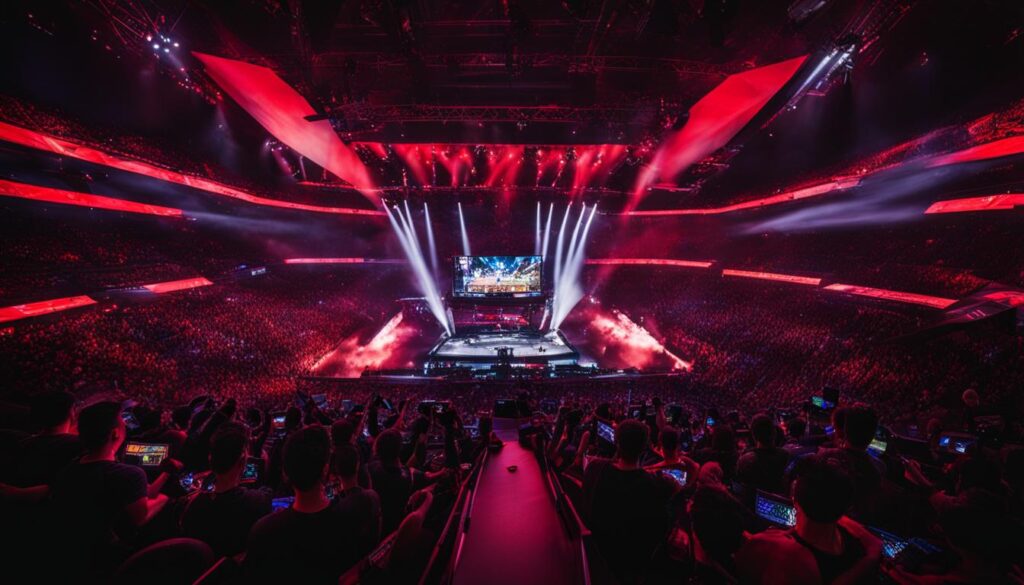As a media and production professional deeply rooted in the competitive gaming landscape, I’ve had a front-row seat to the meteoric ascent of the eSports industry. Fueled by intense matches, strategic gameplay, and a community of zealous fans, eSports popularity has skyrocketed, particularly within the U.S eSports scene. It’s an electrifying world where every click and every move reverberates through stadiums packed with spectators and streams reaching millions online. This burgeoning sector not only defines the cutting edge of digital competition but also represents a significant slice of the growing eSports market. Join me as I unfold the thrilling saga of competitive gaming growth and its evolution from niche pastime to a global sporting juggernaut.
In the United States, the eSports industry commands not just the attention of the younger demographics but has drawn a wide and diverse audience, all united by a profound love for gaming. This explosive growth is reshaping perspectives, elevating the concept of gaming from recreational activity to professional undertaking, and cementing its place in the pantheon of mainstream entertainment.
Key Takeaways
- The eSports industry has experienced unprecedented growth, especially in the U.S., transforming competitive gaming into a widely recognized sport.
- The popularity of eSports is indicative of the market’s potential and the global audience’s growing appetite for digital competition.
- Professional eSports events now captivate millions of viewers, testifying to its burgeoning role in the entertainment sector.
- The U.S eSports scene has become a hub for talent, innovation, and investment, drawing interest from major brands and media.
- Competitive gaming growth continues to surge as eSports establishes itself as a key player in the confluence of technology, media, and culture.
Understanding ESPORTS: The Basics of Competitive Gaming
As I delve into the realm of competitive gaming, it’s essential to grasp the foundational principles that have solidified eSports as a formidable facet within the gaming industry basics. Let me break down the competitive gaming essentials that serve as the scaffolding for this digital colosseum.
The eSports introduction begins with understanding eSports at its core. It’s a world where interactive entertainment is transformed into a fiercely competitive battleground, where players from various backgrounds converge to test their skills. Encapsulating genres like real-time strategy, fighting, first-person shooters, and MOBAs (Multiplayer Online Battle Arenas), eSports fundamentals are not just about having quick reflexes but also about strategic agility and teamwork.
Competitive gaming essentials go beyond just playing the games. The infrastructure of eSports fundamentally rests upon organized, multiplayer settings that offer an equal platform for every participant to shine. Whether it’s a meticulously planned league or a globally anticipated tournament, the essence of competition remains consistent—strive for the pinnacle of performance.
It’s not just a game, it’s a quest for glory, a testament to skill, and a journey to becoming a digital champion.
When I talk about understanding eSports, I emphasize the synergy of man and machine, where tactical prowess meets advanced technology. This synergy is what puts spectators on the edge of their seats and why millions are tuning in to watch these virtual gladiators. This, in essence, is what lies at the heart of the eSports introduction.
- Real-time strategy games demand foresight and expert control of resources and units.
- Fighting games showcase reflexes and the ability to read an opponent’s next move.
- First-person shooters require pinpoint accuracy and team-based strategies to dominate.
- MOBAs blend all these skills, tasking teams with controlling unique characters to triumph on the field of battle.
The thrill of eSports is not just in the victory but in witnessing the journey of players as they advance through intense matches, sharpening their talents and strategies. It’s in the shared passion of the community and the cheers of fans as they root for their favorite teams. This is the thrilling narrative of gaming industry basics evolving into a professional league of its own—a narrative I’m excited to be a part of.
- Grasp the range of games that define the competitive landscape.
- Understand the importance of skill development and the commitment required to excel.
- Recognize the collective journey of players and fans in building the eSports phenomenon.
- Witness the transformation of gaming into a respected and professional athletic discipline.
This guided exploration into the world of eSports serves as a foundational overview for the uninitiated, and a reminiscence of the electric atmosphere for the aficionado. Through this introduction, one can truly begin to appreciate the finesse and complexity that make up the competitive gaming essentials, providing a springboard into the deeper, electrifying waters of the eSports universe.
The Global Stage: How ESPORTS Are Uniting Players Worldwide
As I’ve journeyed through the fast-paced and vibrant world of eSports, I’ve witnessed the powerful ways in which it unites players and fans from every corner of the globe. The magic of international eSports tournaments is not just in the high-stakes competition, but in the remarkable cultural impact they have, gaming across continents, and bringing to life a truly eSports global community. The universal language of gaming transcends physical borders, creating connections that are both deep and far-reaching.
International Tournaments and Their Cultural Impact
There’s something unexplainably thrilling about being part of an international eSports tournament. It’s the allure of competing against the best, the unity of diverse communities rallying behind their champions, and the birth of new traditions within the vibrant fabric of the eSports cultural impact.
What strikes me the most is the way these global eSports competitions seamlessly blend cultures, languages, and traditions into a singular, harmonious eSports cultural phenomenon, further enriched by the spirit of fair play and mutual respect.
In these arenas, we find the intricate tapestry of stories, strategies, and dreams all converging in a spectacle of digital athleticism. This is where history is made, where unknown talents rise to fame, and where eSports becomes more than a game—it becomes a legacy.
Communications Technology Bridging Players Across Continents
As I marvel at the way competitive gaming connects us across thousands of miles, I must give a standing ovation to the ever-evolving communications technology. With each advancement, players and fans become ever more interlinked, creating an ever-expansive international gaming network that is the very backbone of the eSports industry.
- Revolutionary live-streaming platforms bringing tournaments into our homes
- Ultra-low-latency networks ensuring that every second is captured in real-time
- Sophisticated matchmaking systems connecting players of equal skill levels across different continents
These technological marvels are the unsung heroes that foster an inclusive and united global gaming community, giving me—and millions like me—the ultimate eSports experience.
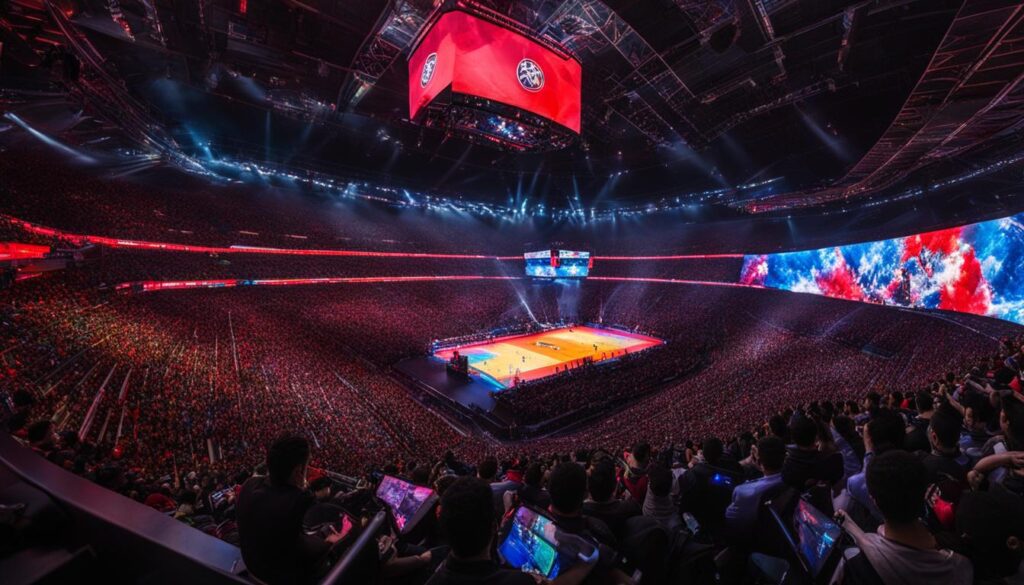
Delving into the cultural influence of eSports, one can’t help but be impressed by its ability to galvanize players from disparate upbringings into a cohesive, passionate collective. By facilitating player connection through technology, the eSports framework not only reinforces universal camaraderie but catapults it into the fabric of global modern culture.
- Feast on the communal energy that international gaming events foster.
- Appreciate the cultural diversity and unification wrought by worldwide eSports tournaments.
- Embrace the technological innovation that makes gaming across continents not only possible but truly remarkable.
- Acknowledge the cultural influence wielded by these virtual competitions as they redefine entertainment.
The electric atmosphere of eSports events has truly been a privilege to immerse myself in. I’ve roared with the crowds, felt the pulse of the global beat, and celebrated the remarkable tapestry that these competitions weave, bringing us all closer together in ways I never thought possible. That is the power of eSports, and that is the future we’re all eagerly crafting, day by epic day.
Behind the Screens: The Technology Powering ESPORTS
Exploring the landscape of competitive gaming, I can’t help but marvel at the sophisticated eSports technology that forms the backbone of this electrifying industry. The roaring sound of the fans, the intense concentration of the players, it’s all upheld by an intricate web of innovative hardware and software. Today, let’s take a journey together, discovering the cutting-edge technology behind eSports that propels gamers to new heights of competitive play.

As an enthusiast and advocate for the digital coliseum we know as eSports, I’ve observed first-hand how advanced gaming hardware is integral to the player experience. High-refresh-rate monitors, gaming mice with pinpoint precision, keyboards that register every keystroke with lightning speed – these aren’t just tools; they’re extensions of the gamers themselves, allowing them to react with the speed of thought.
Every millisecond matters in competitive play, and the hardware we use is designed to ensure that every command is executed flawlessly.
In parallel, the significant role of competitive gaming software cannot be overstated. Developers tirelessly work behind the scenes, crafting code that optimizes performance, enhances realism, and delivers immersive environments that captivate spectators and players alike. This is where the real magic happens; it’s the soul behind the screens that makes or breaks the eSports experience.
- High-frame-rate graphics that keep up with the whirlwind pace of competitive matches
- Real-time strategy systems giving players complete control over their virtual battlegrounds
- Seamless interaction interfaces that connect gamers with their audience real-time
Let’s also give a nod to the immense gaming platform innovation that has brought eSports into the limelight. Streaming platforms that serve as the stage for eSports narratives to unfold, VR technologies that promise to revolutionize how we spectate, and AI that brings smarter, more challenging play to the arena. These have all been pivotal in catapulting eSports from niche to mainstream, letting anyone, anywhere, engage with the sport they love.
Indeed, the technology behind eSports is an ever-evolving beast, each advancement setting the stage for more thrilling, more competitive, and more accessible eSports experiences around the globe. It’s about more than just keeping up; it’s about pushing the boundaries of what is possible and redefining the world of competitive gaming.
- Appreciate the relentless pursuit of technological advancement in gaming hardware professionals trust.
- Recognize the significance of software’s role in crafting unforgettable gaming narratives.
- Celebrate the platform innovations that have expanded eSports’ reach and impact.
In closing this glimpse behind the screens, I’m filled with excitement for what the future holds. The technology conjured up by brilliant minds around the world doesn’t just power eSports, it elevates it, making every match a testament to human ingenuity and passion. As I continue my journey in this industry, my excitement for the next innovation is matched only by my admiration for the tech we wield today. This is the pulse of eSports, and this is why I am thrilled to be part of this incredible movement.
From Hobby to Career: Opportunities in The ESPORTS Industry
As we navigate the dynamic realm of eSports, it’s exhilarating to witness the transformation of gaming from a leisurely pastime to a viable career option. The emergence of eSports career opportunities has redefined aspirations, proving that with talent, passion, and dedication, turning a hobby into a livelihood is more than just a dream—it’s a tangible reality.
The Role of Content Creators in ESPORTS
In my journey through the dynamic landscape of competitive gaming, I’ve seen firsthand the potent impact content creation in eSports has on the industry.
- Streamers capturing every moment, providing real-time entertainment and commentary
- Video producers crafting compelling narratives around tournaments and player stories
- Writers and journalists covering events, offering insights and analyses
These creatives are the uncrowned kings and queens, forming the backbone of the ESports streaming phenomenon and stimulating growth within this sector.
By delivering engaging media and establishing vibrant communities, content creators are the lifeblood of the eSports ecosystem, understanding the nuances of content strategy for eSports and solidifying the influencer presence in gaming.
Professional Gaming: What It Takes to Compete at the Top
When we speak of professional gaming careers, we’re referring to more than just playing games for a living. It’s about embodying the essence of competition at its highest form, where becoming one of the elite competitive gamers or top-tier players in eSports requires an all-encompassing commitment.
- Rigorous training regimes and strategic study sessions
- Physical and mental fitness to sustain hours of focused play
- Teamwork and collaboration with fellow players and coaches
To truly flourish, one must engage with others in the scene, understand complex game mechanics, and adapt swiftly to the ever-shifting metas.
Potential for Content Creators: Building a Brand in ESPORTS
The avenue of building a brand in eSports is a venture that calls for content creators to not only be adept at gaming but also to be savvy entrepreneurs. Establishing a personal branding in gaming goes hand-in-hand with becoming an eSports influencer.
- Comprehend the pulse of the market and the interests of your audience
- Engage with your community and leverage platforms to enhance your reach
- Create content that resonates, educates, and entertains
Ultimately, it’s about carving out a distinctive niche that aligns with the values and preferences of those who consume eSports content.
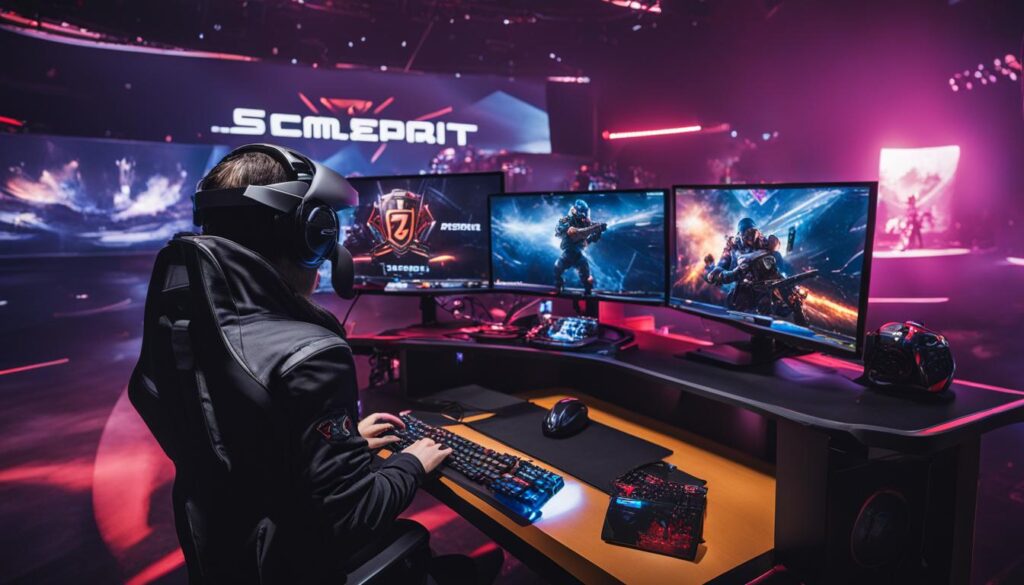
In conclusion, the avenues for establishing oneself within the eSports domain are expansive. Whether you’re an aspirant looking to delve into professional gaming or a creative mind eager to make a mark through content creation, the opportunities are as rich and diverse as the games we love. I am invigorated by the potential this industry holds, and its trajectory only points upward from here.
ESPORTS in Media: The New Frontier for Entertainment
As I reflect on the journey of eSports through the dynamic channels of mainstream media, it’s evident that we’re witnessing an unparalleled eSports media transformation. What was once a niche hobby has now erupted into a full-scale entertainment sensation, with eSports broadcasting charting new territories in the digital age.
The ripple effect of eSports within the ever-adaptive entertainment sector cannot be overstressed. Its impact has been akin to a thrilling novel that captivates the reader’s imagination, page after page. Similarly, the vibrant narrative of competitive gaming entertainment has encapsulated audiences worldwide, firmly asserting its place on the big stage. Let’s delve deeper into this transformation, shall we?
ESPORTS is not just breaking into the media—it’s reshaping it, bending it to the electric pulse of competitive gaming.
- The high-octane excitement of live tournaments.
- The gripping tales woven through content production.
- The strategic partnerships forging new paths for media coverage.
All contribute to the elevated stature of eSports in the world of media and entertainment. Its seamless integration across various mediums—social platforms, television networks, and a multitude of streaming services—is a testament to its magnetic allure.
- Its unstoppable ascent as a cornerstone of modern digital leisure.
- The innovative strategies propelling its visibility to new heights.
- The synergy between audience expectation and content creation.
And, let’s not bypass the powerful media influence on eSports; a synergistic cycle that perpetually feeds the growth and allure of the industry. As broadcast quality keeps soaring and production values continue to astonish, the content we consume shapes our perceptions and expectations, further entrenching eSports in the media landscape.
Friends, the union between eSports and media is akin to watching a star being born—brilliant and bound to leave an indelible mark on the cosmos of entertainment. With every live broadcast, the narrative deepens, the fandom widens, and our collective enthusiasm for this phenomenon burns brighter.
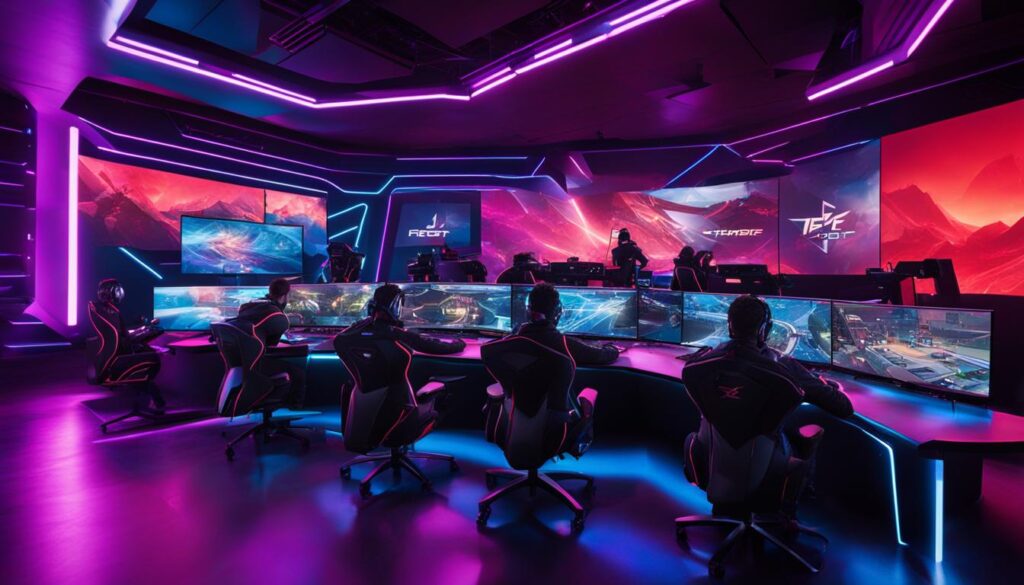
Indeed, we are the heralds and witnesses to eSports media transformation—a pivotal chapter in the ongoing saga of competitive gaming entertainment. As we forge further into this new frontier, I cannot help but be exhilarated by the limitless potential that awaits. Hello, world—eSports has arrived, and it’s here to stay.
Fan Engagement: How ESPORTS Fandom is Outpacing Traditional Sports
As I’ve observed the shifting landscapes between eSports and traditional sports, one aspect that stands out is the eSports fandom growth. In a digital age where interactivity and instant connection are paramount, eSports has taken fan engagement to unprecedented levels. The passion and energy of eSports enthusiasts are evident across multiple platforms, signifying not just a trend, but a fundamental shift in how fans interact with their favorite pastimes.
Where traditional sports fandom may revolve around seasonal games and live events, eSports fans are immersed in a continuous cycle of engagement that thrives on connectivity and inclusivity.
- Real-time interactions with eSports icons through streaming platforms
- Global forums that spark discussions and foster community building in eSports
- Virtual events that offer immersive experiences surpassing geographical limitations
This cultivation of community coupled with smart fan engagement strategies has become a cornerstone of eSports, inviting fans into a shared journey—celebrating victories, analyzing defeats, and even influencing game strategies. It’s a living, breathing entity that goes beyond just viewership.
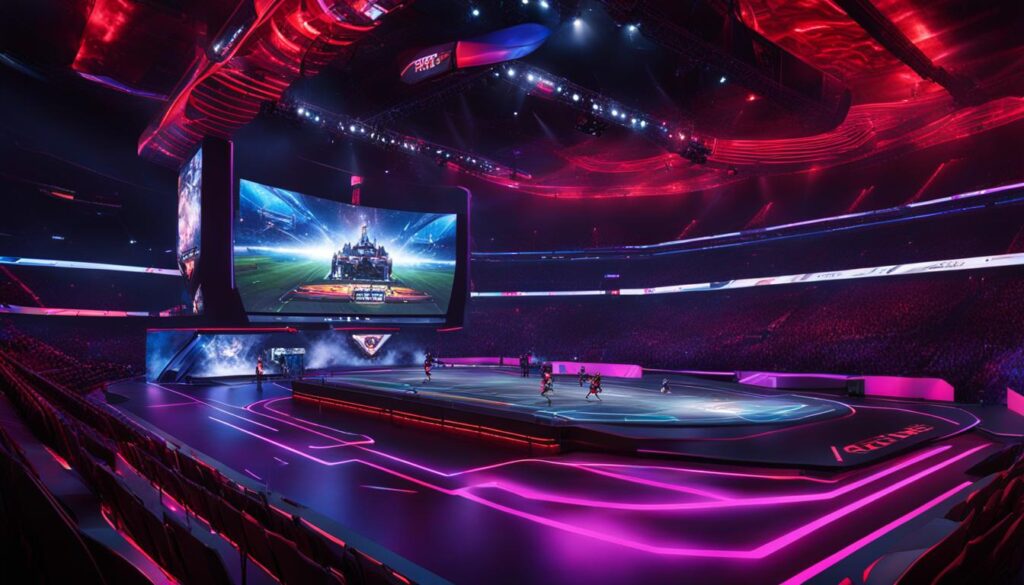
When we compare eSports versus traditional sports, the stark contrast in fan engagement becomes particularly noticeable. Traditional sports fans might wear their team’s colors, attend games, or follow scores online. In contrast, eSports enthusiasts are likely to be part of a global conversation, tuning in to watch their favorite players train on live streams, participating in fan-run tournaments, and engaging in real-time across various digital platforms.
- Engagement through interactive gaming platforms and social media channels
- Structuring fan-driven content, like amateur commentary and analysis
- Organizing community-driven events that bond fans with pro-players
The key to this burgeoning fandom is the art of community building in eSports. It’s all about creating an environment that facilitates and enriches interaction not just during major tournaments, but every single day. As such, eSports has become an ecosystem that lives and breathes alongside its audience, offering a level of engagement traditional sports are striving to catch up with.
My firsthand encounters in this realm show that the tenacity of eSports is not in its virtual battles alone, but in the hearts and minds of its fanbase—a community perpetually hungry for innovation, interaction, and inclusion. As we continue to break boundaries, it’s clear that eSports is redefining the concept of fandom, etching its electrifying presence into the annals of sporting history.
Regulation and Fair Play: Addressing the Challenges in ESPORTS
As someone deeply entrenched in the world of competitive gaming, I have seen firsthand the importance of eSports fair play. Ensuring a level playing field is not only critical for the competitors but also for maintaining the legitimacy and excitement that fuels the industry’s growth. It’s an ongoing battle against the undercurrent of cheating that seeks to undermine the spirit of competition—a challenge I’m proud to say we’re tackling head-on.
In the high-stakes world of professional gaming, a single lapse in integrity can ripple through the entire eSports ecosystem, which is why anti-cheat technology and stringent regulations are the bedrock of our competitive integrity.
Maintaining fair play is about more than just rules; it’s about cultivating an environment where every player, team, and tournament organizer holds themselves to the highest standard. The trust of players, fans, and sponsors is paramount, and without it, the foundation of eSports crumbles.
Anti-Cheat Technologies and Upholding Integrity in Competitions
My commitment to upholding the essence of fair competition leads me to explore the cutting-edge anti-cheat technology that safeguards the integrity of every match. With advanced algorithms and surveillance tools, these technologies ensure that skill and strategy determine the outcome—not who has the better hack.
- Real-time monitoring systems designed to detect and deter illicit activity
- Machine learning algorithms that adapt and evolve to catch new cheating methods
- Secure platforms that provide transparent oversight for all participants
Overcoming eSports regulation challenges is not a task for the faint-hearted. As a professional surrounded by the passionate eSports community, I know it takes a shared commitment to combat cheating head-on, promoting an ethos of sportsmanship that resonates across every level of play. It’s a collaborative effort involving players, developers, regulators, and fans worldwide.
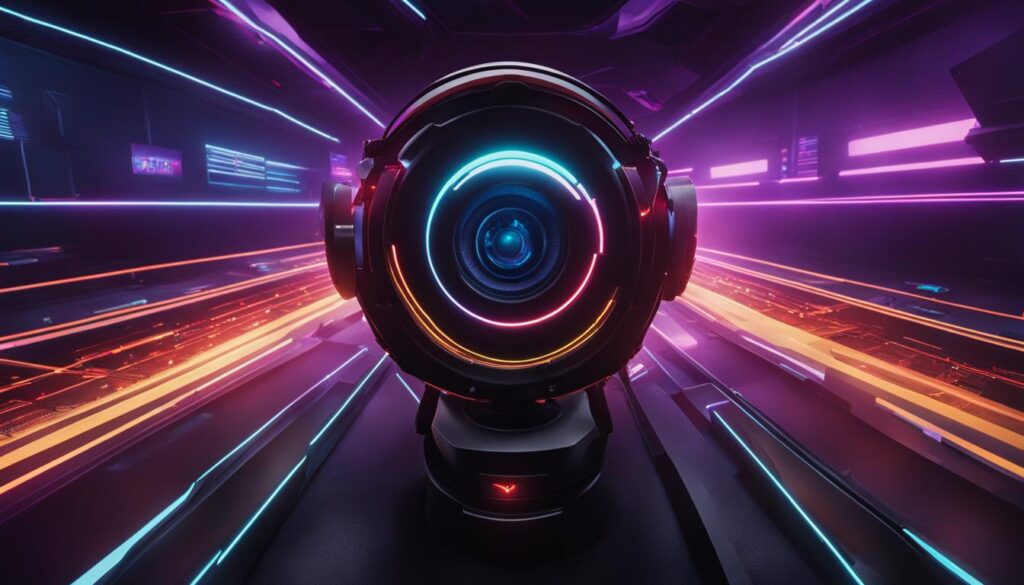
Number 9 in eSports is not just a figure on a jersey; it symbolizes the endurance, the daily grind, and the unwavering resolve in the pursuit of competitive authenticity. It’s a reminder of our commitment to ensure every tournament, league, and casual match resonates with the genuine spirit of competition.
- Implement rigorous standards and protocols to maintain eSports integrity.
- Leverage the latest technological advances to combat cheating in gaming.
- Foster a culture where fair play is celebrated and upheld by all participants.
- Ensure that fans and players alike can trust in reliable eSports competitions.
My mission is clear—to champion the values that make eSports a thrilling and respectable field: fairness, respect, and the indomitable spirit of competition. Together with the broader eSports community, I am committed to protecting the integrity of a pastime that has captivated the hearts of millions and will continue to do so for generations to come.
Investing in the Future: The Financial Ecosystem of ESPORTS
As I delve into the vitals of eSports financial investment, it’s abundantly clear that it encapsulates a thriving, multilayered arena ripe for strategic moves and fiscal growth. The eSports ecosystem is burgeoning, capturing the imagination of investors who recognize the transformative power and economic potential enclosed within this digital coliseum of competition.
With every button press and strategic decision, the eSports industry cinches its position as a formidable driver of economic advancement.
The role of sponsorship in eSports has evolved significantly, becoming a linchpin for teams and events that seek longevity and financial stability. Major consumer electronics brands, beverages, and even automotive giants are hitching their wagons to this shooting star, amplifying their reach throughout the gaming community.
- Enticing partnerships between leading tech companies and prominent eSports leagues
- Collaborations with global apparel brands for exclusive merchandise lines
- Integration of innovative financial services to ease transactions for in-game purchases
The gaming industry economics are nothing short of extraordinary, with revenue streams branching from merchandising, media rights, advertising, and the gamut of digital content catering to an audience that prizes interactivity and engagement above all else.
- Identifying cogent investment avenues within diverse gaming platforms and titles
- Navigating through investment strategies tailored to the nuanced needs of eSports entities
- Maximizing returns by sponsoring tournaments that resonate with a vast global audience
Let’s not sideline the transformative potential embodied in the influx of venture capital that is laser-focused on innovative startups within the eSports space. It’s a signal, loud and clear, that the future of entertainment, engagement, and enterprise converges here, in the realm of competitive gaming.

My vision extends to the horizon of what eSports will morph into – a juggernaut of digital evolution. And by investing now, early birds in the financial domain are poised to reap the rewards of this unprecedented global phenomenon.
As we look to the horizon, the silhouette of eSports stands tall against the sky of innovation and enterprise. My enthusiasm, matched only by the disciplined zeal of the players and fans that make up this incredible sphere, tells me one thing – the eSports financial ecosystem is not just surviving; it’s thriving.
Conclusion: ESPORTS as a Cultural Phenomenon
In my ventures through the dynamic and exhilarating world of digital competition, I have come to recognize the eSports cultural significance within our society. It’s been an extraordinary journey, bearing witness to the transformation of eSports from niche gaming activities to a global cultural phenomenon. As we forge ahead, we see that eSports is more than just entertainment—it has blossomed into a lifestyle, intertwining with the fabric of our everyday lives.
This unprecedented growth has solidified gaming culture as an inseparable thread in the tapestry of international customs and practices. The societal impact of eSports is unmistakable, altering the way we interact, consume media, and even perceive career aspirations. For me and countless others, eSports represents a revolution, shaping the new face of competitive spirit and camaraderie across the globe.
Whether as a player, a fan, or a member of the multifaceted industry that supports this ecosystem, the influence of eSports extends beyond the screen—it’s a symbol of our times, reflecting the technological ethos and community-driven passion of the digital age. As we embrace the challenges and triumphs that come with this territory, I proudly look back on the memorabilia of virtual contests and forward to the boundless opportunities on the horizon. Indeed, eSports is here to stay, profoundly etched in our collective experience.
FAQ
What is driving the explosive growth of the eSports industry?
The growth is largely driven by the increasing popularity of competitive gaming, advancements in gaming technology, the expansion of online platforms for streaming, and rising global viewership which solidify eSports as a significant part of the entertainment sector, especially in the U.S eSports scene.
For someone new to eSports, how would you describe its fundamentals?
Essentially, eSports involves competitive gaming where individuals or teams play against each other, often in organized, multiplayer settings. It’s grounded in skills, strategy, and teamwork, with a variety of game genres embodied in virtual arenas, making up the vibrant core of the gaming industry basics.
How do international eSports tournaments impact global culture?
International eSports tournaments not only showcase elite competitive gaming but also forge significant cultural phenomena, bridging the gap between different cultures and creating a unified global community, thus amplifying the eSports cultural impact worldwide.
What kind of technology is crucial to the operation of eSports?
Competitive gaming software, high-performing gaming hardware, and sophisticated gaming platforms are crucial. Together, they facilitate seamless gameplay, interactive features, and high-resolution streaming, which are the technological backbones behind eSports.
What career opportunities does the eSports industry offer?
Beyond professional gaming, the industry offers careers in content creation, event management, coaching, marketing, and business development. The growth of eSports career opportunities mirrors the expansion of the industry itself.
What role do content creators play in eSports?
Content creators are key to the narrative of eSports. They engage audiences through streaming, provide commentary, produce game-related content, and shape the community by influencing fans and players alike, becoming integral to content creation in eSports.
What does it take to become a professional gamer?
It requires exceptional gaming skills, strategic thinking, discipline, consistent practice, and dedication to continuous improvement. Competing at the top-tier levels in eSports also involves understanding game mechanics deeply and working well within a team.
How can content creators build a successful brand in eSports?
Success stems from creating authentic, engaging content, establishing a strong presence on social media, understanding the preferences of the gaming audience, and consistently offering value, which together form the crux of building a brand in eSports.
In what ways is eSports transforming mainstream media?
Through live broadcasting of tournaments, dedicated gaming channels, strategic partnerships with traditional media entities, and the rise of eSports personalities, competitive gaming entertainment is becoming an integral part of the media landscape.
How does fan engagement in eSports compare to traditional sports?
eSports fandom growth is rapidly outpacing traditional sports through digital innovation, allowing fans to directly interact with players and participate in gaming experiences, further fueled by community-building platforms and social media.
What technologies are ensuring fair play in eSports?
Anti-cheat technology plays a pivotal role in maintaining competitive integrity. These sophisticated systems monitor for unfair advantages, ensuring reliable eSports competitions and upholding the very essence of eSports fair play.
Why should one consider investing in the eSports financial ecosystem?
With its vast audience, brand partnerships, and sponsorships, the gaming industry economics offer unique investment opportunities. The financial ecosystem of eSports is ripe with potential, characterized by growth, scalability, and a young, engaged demographic.
How has eSports evolved into a cultural phenomenon?
eSports has transcended its entertainment origins to influence lifestyle choices, inspire social communities, and drive technological innovation, marking its role as a powerful cultural force that impacts both societal norms and gaming culture.
